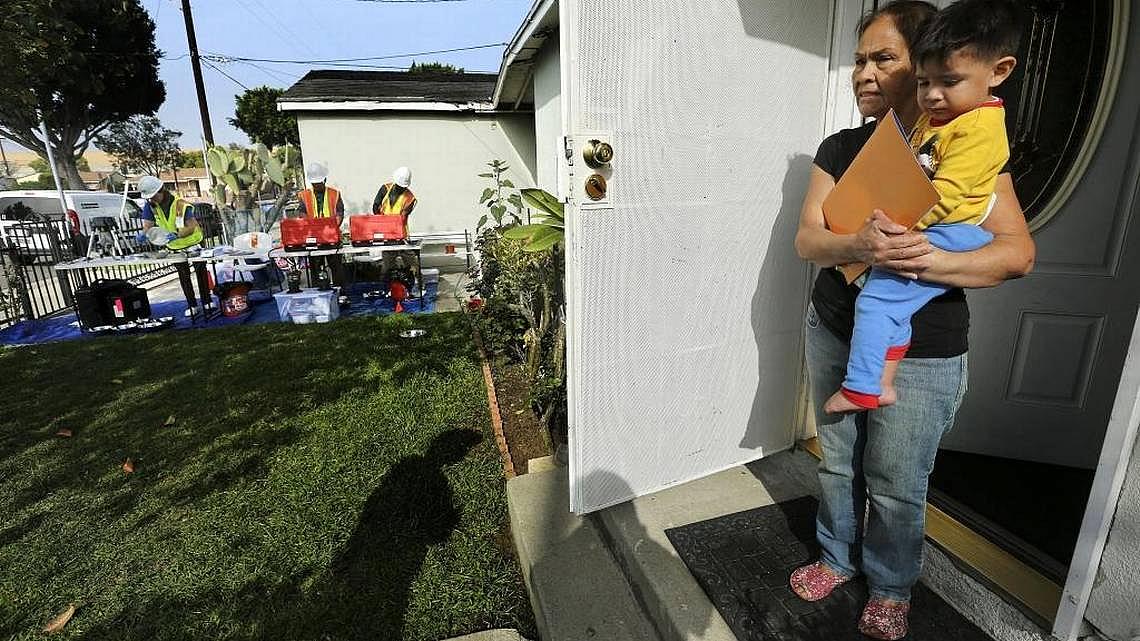Why is California not doing more to stop lead poisoning?
Bill Allayaud is California director of government affairs for the Environmental Working Group. Joe Rubin investigated the Exide plant as a data reporting fellow at the USC Annenberg Center for Health Journalism.
Other stories from Joe Rubin:
Battery Blood: How California Health Agencies Failed Exide Workers
Battery Blood: California has worse lead standards than Arkansas and Texas. Why?
Did Disneyland try to sink a bill protecting workers from lead poisoning?
Bay Bridge Dismantling Project Was a Lead-Contamination Site
Hundreds of workers have lead poisoning. Why hasn't Cal/OSHA stepped in?
County Temporarily Closes Milpitas Gun Range and Neighboring Kids’ Gym After Detection of Lead Dust
Lead Contamination: Questions Remain in Santa Clara County Business Closures
Did California’s Health Dept. Help Lobbyists Fight Lead Bill?

Otilia Franco and her grandson Noe Avina, 2, stand in front of their home in Commerce in February 2016. The Los Angeles County Health Department tested the soil for possible lead contamination from a nearby closed Exide battery plant. Mel Melcon Los Angeles Times/TNS
By Bill Allayaud and Joe Rubin
It created a national scandal when residents of Flint, Michigan, had to drink and bathe in water badly tainted with lead. Closer to home, the city of Sacramento’s Mangan Park gun range made headlines when it was revealed that it was loaded, both inside and out, with extremely high levels of dangerous lead dust – and that the California Department of Public Health knew about lead-poisoned workers for years without acting.
The Exide battery recycling plant in the Los Angeles area was a worst-case scenario. Hundreds of workers ended up with unsafe blood lead levels, and because the situation lingered, the neighborhood ended up covered with lead dust.
Assembly Bill 2963, which is to be heard Wednesday by the Senate Health Committee, aims to ensure there are no more cases like Exide or Mangan Park.
Assemblyman Ash Kalra of San Jose authored the bill after learning of state inaction to protect Exide workers. AB 2963 simply requires the two state agencies with oversight to do a better job – mandating that the California Department of Public Health turn over reports of high lead levels in blood to the California Division of Occupational Safety and Health and that Cal/OSHA investigate those cases.
Family members exposed to lead can track it home. Rania Sabty-Daily, a professor of occupational health at Cal State Northridge, told us that “when parents are overexposed, their unborn children and kids at home are at highest risk.”
Normally a leader on health and the environment, California lags behind 37 states, which already have standards that require occupational health agencies to inspect workplaces where workers have been found to have high levels of lead (more than 25 micrograms per deciliter) in their blood. These inspections have led to fines and improved safety in states including Texas, Louisiana and Ohio.
While it might seem that this bill would sail through the Legislature, it passed the Assembly on May 30 with the minimum number of votes due to lobbying by the California Chamber of Commerce and its allies. Opponents claim the bill is wasteful because there are worse worker safety problems.
But isn’t one worker getting brain-damaged by lead one worker too many when it can be avoided?
The Senate Health Committee is led by Sen. Richard Pan, a Sacramento pediatrician. When he heard about the Mangan gun range contamination, he said that lawmakers should look into what role the state agencies “can play to mitigate the problem and ensure that people are protected.”
Now Pan has a chance to help fix a broken state system by helping pass AB 2963 out of his committee.
[This story was originally published by The Sacramento Bee.]

